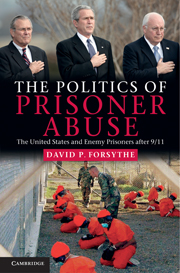Book contents
- Frontmatter
- Contents
- Preface
- List of abbreviations and acronyms
- 1 Torture and political morality in historical perspective
- 2 Political morality and the Bush Administration
- 3 Bush lawyers: the politics of legal interpretation
- 4 The military: Afghanistan, Guantánamo, Iraq
- 5 The CIA: kidnapping, Black Sites, extraordinary rendition
- 6 Due process: detention classification, Military Commissions
- 7 Prisoner abuse and the politics of transitional justice
- Annex A Cast of principal characters
- Annex B Reports on US policy toward enemy prisoners
- Annex C Some relevant legal norms: selected provisions
- Annex D Timeline, selected events, Bush Administration
- Index
- References
6 - Due process: detention classification, Military Commissions
Published online by Cambridge University Press: 05 June 2012
- Frontmatter
- Contents
- Preface
- List of abbreviations and acronyms
- 1 Torture and political morality in historical perspective
- 2 Political morality and the Bush Administration
- 3 Bush lawyers: the politics of legal interpretation
- 4 The military: Afghanistan, Guantánamo, Iraq
- 5 The CIA: kidnapping, Black Sites, extraordinary rendition
- 6 Due process: detention classification, Military Commissions
- 7 Prisoner abuse and the politics of transitional justice
- Annex A Cast of principal characters
- Annex B Reports on US policy toward enemy prisoners
- Annex C Some relevant legal norms: selected provisions
- Annex D Timeline, selected events, Bush Administration
- Index
- References
Summary
Whoever says war, says law of war.
(Patrick Jarreau, Le Monde, June 30, 2004)[To claim that] the president has all the powers of a normal war yet few of its restraints, that the whole world is his battlefield, and that this state of affairs goes on in perpetuity is really akin to claiming a kind of worldwide martial law. It only stood to reason that the public – and the courts – would eventually grow uneasy.
(Benjamin Wittes, Law and the Long War: The Future of Justice in an Age of Terror, New York: Penguin Press, 2008, p. 64)By now it should be evident that the George W. Bush Administration not only tried to deconstruct the international legal regime designed to protect prisoners in war and other national emergencies, certainly in Afghanistan and at Guantánamo, a legal regime incorporated into US law for the most part. But also it tried to keep other authorities, primarily the US courts, from reviewing any of its decisions related to prisoner matters. President Bush asserted an unlimited authority to engage in endless administrative detention; a unilateral authority to declare persons, even American citizens, “unlawful enemy combatants” who, ipso facto, had forfeited all legal rights, including a right to legal counsel and a right to habeas corpus; an absolute authority to avoid review of any of its decisions pertaining to alien prisoners held outside the United States; and a unilateral authority to establish Military Commissions to try enemy prisoners whose rules would be determined by the Executive alone.
- Type
- Chapter
- Information
- The Politics of Prisoner AbuseThe United States and Enemy Prisoners after 9/11, pp. 162 - 191Publisher: Cambridge University PressPrint publication year: 2011



